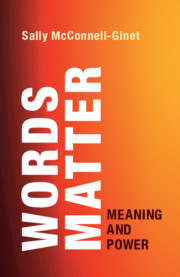Book contents
- Words Matter
- Words Matter
- Copyright page
- Contents
- Figures
- Acknowledgments
- Getting Started
- 1 Labeling: “What Are You, Anyway?”
- 2 Marking/Erasing: “Instead of Saying ‘Normal Americans,’ You Can Just Say ‘Americans’”
- 3 Generalizing: “All the Women Are White, All the Blacks Are Men, but Some of Us Are Brave”
- 4 Addressing: “All Right, My Man … Keep Your Hands on the Steering Wheel”
- 5 Putting Down: “[They] Aren’t People – They’re Animals”
- 6 Reforming/Resisting: “It’s Like a Kind of Sexual Racism”
- 7 Authorizing: “When I Use a Word It Means Just What I Choose It to Mean … [But Who] Is to Be Master?”
- 8 Concluding
- References
- Index
6 - Reforming/Resisting: “It’s Like a Kind of Sexual Racism”
Published online by Cambridge University Press: 24 August 2020
- Words Matter
- Words Matter
- Copyright page
- Contents
- Figures
- Acknowledgments
- Getting Started
- 1 Labeling: “What Are You, Anyway?”
- 2 Marking/Erasing: “Instead of Saying ‘Normal Americans,’ You Can Just Say ‘Americans’”
- 3 Generalizing: “All the Women Are White, All the Blacks Are Men, but Some of Us Are Brave”
- 4 Addressing: “All Right, My Man … Keep Your Hands on the Steering Wheel”
- 5 Putting Down: “[They] Aren’t People – They’re Animals”
- 6 Reforming/Resisting: “It’s Like a Kind of Sexual Racism”
- 7 Authorizing: “When I Use a Word It Means Just What I Choose It to Mean … [But Who] Is to Be Master?”
- 8 Concluding
- References
- Index
Summary
Words can and do change. Social reform often goes hand in hand with linguistic reform. Introducing words like sexism and sexual harassment has allowed feminist thinkers and activists to uncover patterns of attitudes, behavior, and institutions that supported men’s control of women and made men into default people. Black women, realizing that identities intertwine, have introduced intersectionality and words like womanism and misogynoir to develop their insights. But it’s not just new words. Evolving insights into racial injustice have led many to rethink words like racism, but conflict over racial matters persists and often emerges in disputes over interpreting racism. Changing attitudes towards women and LGBTQ people have affected what courts and ordinary people take rape to mean. Recognition of gender nonbinarism and of gender instability has meant that he and shecan no longer be assumed sufficient for third-person reference to individual people. Some rejecting gender binaries as well as transgender people have begun announcing their own preferences for how others should refer to them pronominally, with singular they, a nonbinary option, among the possible PGPs (preferred gender pronouns). Users of ASL (American Sign Language) also sometimes ‘reform’ signs, rejecting suggestions that these changes are mere euphemisms.
Keywords
- Type
- Chapter
- Information
- Words MatterMeaning and Power, pp. 174 - 214Publisher: Cambridge University PressPrint publication year: 2020

